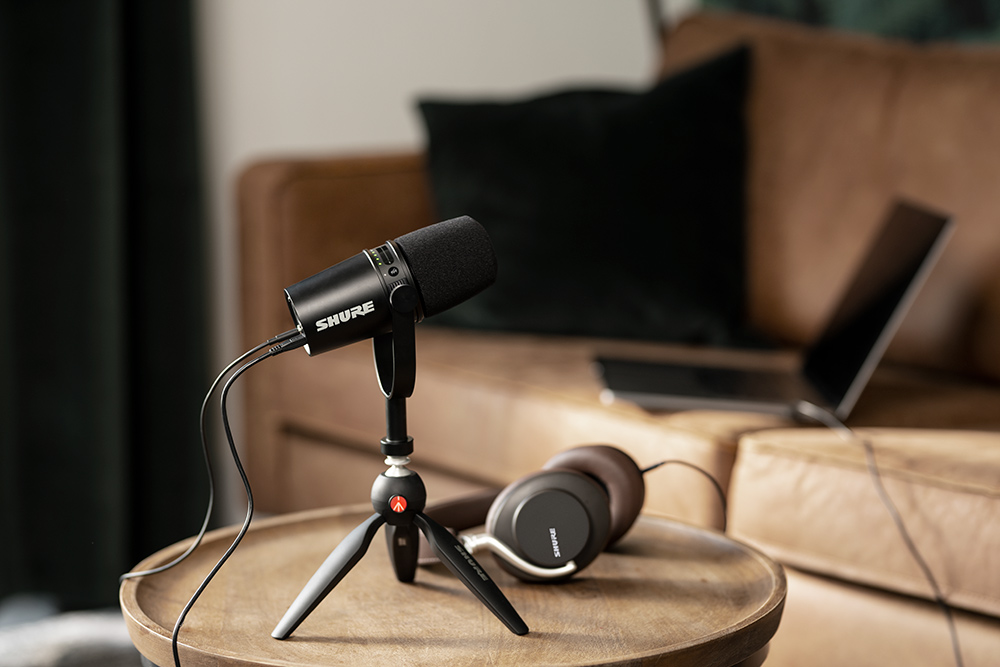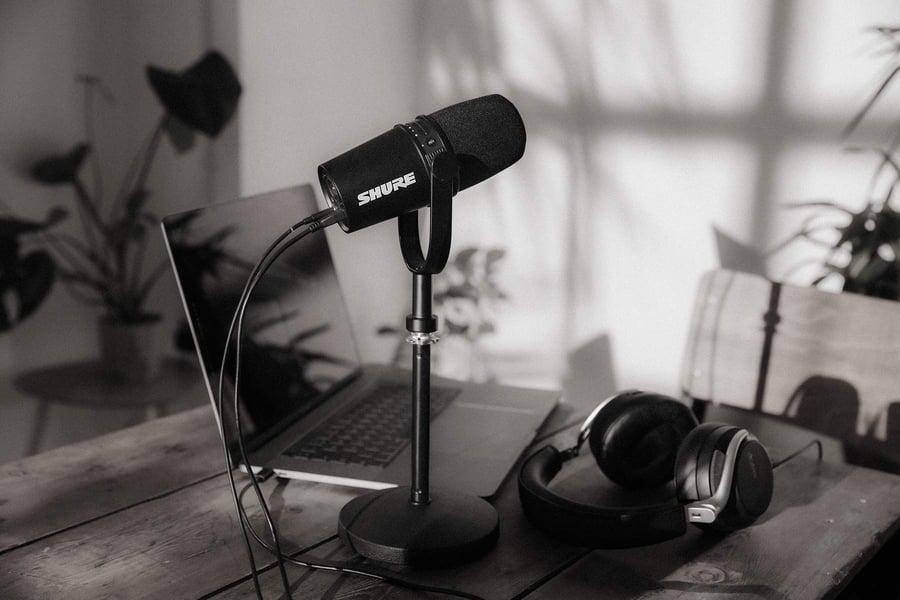Products featured are independently selected by our editorial team and we may earn a commission from purchases made from our links; the retailer may also receive certain auditable data for accounting purposes.
Over the last decade, podcasts have risen to become one the digital world’s most prominent storytelling mediums. With the rise of podcasting, there’s been a concurrent surge of interest in broadcast microphones. And one microphone in particular has become synonymous with chart-topping podcasts: the Shure SM7B.
The SM7B, a staple of professional radio stations and recording studios for decades, has become so ingrained in podcast lore, in fact, that podcasters get ridiculed for not using one. “I’m noticing that you guys have unconventional podcast microphones,” said musician Jonathan Rado on an episode of the Bob Dylan podcast, Jokermen, earlier this year.
Rado, who produced the two most recent albums by The Killers, wasted no time schooling the hosts on the conventions of the medium. “The standard is the SM7B,” he said. “That’s what Rogan uses and Maron. I think you gotta upgrade soon if you want to keep this thing going.”
The SM7B certainly is a classy broadcast microphone, but not everyone gets US$100 million from Spotify to spend on podcast production. However, there is a broader point behind Rado’s audiophile bullying: if you’re making a podcast, then it should sound good.
Starting a podcast doesn’t have to be difficult—all you need is an idea, a microphone and an internet connection. But as podcast popularity grows, so too do listener expectations. We’ve endured enough barking dogs and scratchy Zoom feeds and now want our favourite podcasts sounding reliably clean and intimate.
So what if you’re a podcast newbie and still want premium sound? Look no further than Shure’s MV7 podcast microphone.
Shure MV7 Podcast Microphone
The MV7 is a descendant of the SM7B that, along with retailing at nearly 50% cheaper, was specifically designed to meet the needs of podcasters. It’s a digital microphone that plugs directly into your Mac or PC with a USB cable. The base of the microphone includes a 3.5mm headphone jack, letting you connect your cans and get a clear picture of the sound travelling through the mic. It has a regular XLR input too, meaning you can run it into an audio interface or PA system should you please.
The MV7 is equipped with Voice Isolation technology, which brings vocals to the front while blocking out any unplanned background noise. This is the consequence of some advanced acoustic engineering, with Shure intent on designing a mic that would emphasise vocal clarity while pushing away room reverb and any lower, rumbling frequencies. This makes it the perfect mic for recording in ad hoc studio set-ups—you know, like bedrooms or broom closets.
Shure added a few other neat tweaks to distinguish the MV7 from the SM7B, too, such as an on-mic touch pad that allows you to adjust mic gain, headphone level and monitor mix, and mute yourself. For more in depth sound configuration, the MV7 syncs up with the ShurePlus MOTIV app, which gives you enhanced control over gain, EQ and the mic’s in-built limiter and compressor.
If this all sounds a bit complicated, rest easy, as Shure recognise that not all budding podcasters are audio tech nerds. You can simply select Auto Level Mode in the MOTIV app, which then monitors the sound for you and automatically adjusts the microphone settings as you record.
The MV7’s utility doesn’t begin and end at podcasting, either. By virtue of the touchscreen display, dual XLR and USB outputs and headphone jack, the MV7 is an ideal streaming and gaming mic. Whether you’re live on Discord or making your friends weep on Twitch, the vocal clarity offered by the MV7 puts it a few noses ahead of the competition.
The rise of podcasts

The Shure MV7
The term “podcast” is a portmanteau of iPod and broadcast. Apple certainly fostered the medium’s early growth, but podcast is now a blanket term for any on-demand audio content that consists largely of people speaking.
Podcasts emerged in the mid-‘00s and were initially the domain of radio stations who wanted to make their shows available on demand. In recent years, however, the podcast’s popularity has exploded, and so too has the diversity of those creating them.
According to The Infinite Dial 2021 Australia—a study of digital media behaviour published by Edison Research this April—26% of Australians aged 12 and over are weekly podcast listeners; a 53% rise on the previous year. Weekly podcast listeners average five podcast episodes a week, while Edison estimates that 12% of weekly podcast listeners (close to 700,000 Australians) are listening to 11 or more podcasts per week.
People who aren’t podcast fanatics aren’t exactly oblivious, either. The Infinite Dial reports that 91% of Australians know what a podcast is and 37% of the 12+ population is likely to have listened to a podcast in the last month. The numbers are similar in the US, where 41% of the 12+ population are monthly podcast listeners and 28% listen weekly.
Why does good audio matter?
It’s tempting to dismiss the role audio quality plays in building a podcast audience. After all, not many podcast descriptions emphasise the use of top of the line recording equipment in the show’s creation. However, there are a few things to consider when evaluating how much of your budget should go towards the audio specifics.
Podcasts are an evolution of the intimacy provided by radio broadcasts. The most successful radio hosts become like trusted companions to their listeners. Podcasts go a step further by 1) being available on demand and 2) not having to comply with the formulaic customs of radio production and station programming.
But given the enhanced intimacy, audience expectations can be a touch irrational. Forget the fact that podcasts come to us for free, on a regular basis, stimulating thought or indulging our interest in celebrity gossip and elite sportspeople—why can we hear the host’s chair creaking? And couldn’t this guest have waited until after the interview to eat their salad?
You’ve also got to consider how people are discovering new podcasts. As we’ve seen, the hunger for new podcasts is surging, but the method for finding new shows is a contrast to what it was five or ten years ago. Back then, you might’ve learned that a favourite comedian, such as Wil Anderson, had started a podcast or that one of your favourite musicians, say, Solange, was on an episode of Song Exploder, and so you hunted it down.
Nowadays, it’s more of a scroll-and-browse method. People will flick through a particular category, such as “wellness” or “politics”, and take a few episodes for a test drive. Suffice it to say, not many listeners are going to hit subscribe if their first impression is of a voice echoing from the back of the room while a washing machine wheezes next door.
If you want to get your podcast sounding reliably clean and intimate without having to employ a team of audio engineers, then Shure’s MV7 Podcast Microphone is the ideal option.






































